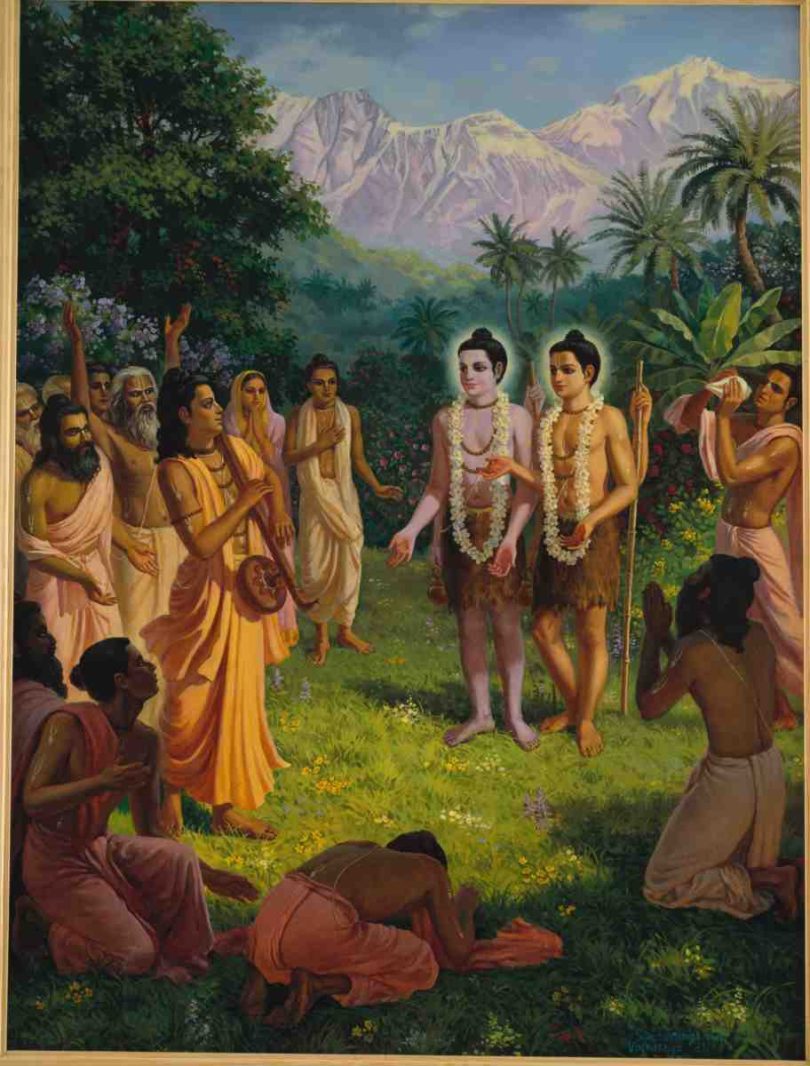Question: SB 1.2.4 mentions four personalities who must be offered respect, before reciting Srimad Bhagavatam. What is the reason why Nara-Narayana Rsi’s name is included?
Answer by Romapada Swami:
The Backward Glance – Bhurijana dasa
The history of Srimad-Bhagavatam and information about when it will be spoken again
“Long ago this essential anthology of all the Puranas was spoken by the infallible Lord Nara-Narayana Rsi to Narada, who then repeated it to Krsna Dvaipayana Vedavyasa. My dear Maharaja Pariksit, that great personality Srila Vyasadeva taught me this same scripture, Srimad-Bhagavatam, which is equal in stature to the four Vedas.” (SB. 12.4.41-42)
Srila Visvanatha Cakravarti Thakura notes that Sukadeva Gosvami spoke this text to indicate that this literature should be studied, taught, heard, and recounted from the unbroken disciplic line of divine, pure spiritual masters. He explains that “the wise Narayana taught [the Bhagavatam] to Brahma, who, without a decrease in bhakti because of having no offenses, taught it to Narada.”
“O best of the Kurus, the same Suta Gosvami who is sitting before us will speak this Bhagavatam to the sages assembled in the great sacrifice at Naimisaranya. This he will do when questioned by the members of the assembly, headed by Saunaka.” (SB. 12.4.43)
Both Srila Sridhara Svami and Visvanatha Cakravarti Thakura say that Sukadeva Gosvami pointed into the assembly of sages surrounding him and indicated the Bhagavatam’s next speaker with a ‘That Suta!’
||1.2.4|| — Krama Sandarbha by Jiva Gosvami
Translation
After offering respectful obeisances unto the presiding deities Nara-nārāyaṇa Ṛṣi, unto the subject of the work Kṛṣṇa, unto the śakti of the work Sarasvatī, and unto the sage entrusted with the work Śrīla Vyāsadeva, one should utter “Jaya.”
Commentary
Nara and Nārāyaṇa are the presiding deities of this scripture. The word ca indicates that Kṛṣṇa is also the presiding deity of the work. Sarasvatī is the śakti of the work. The word caiva (sometimes found instead of vyāsam) indicates the sage Vyāsa. The bīja is pranava (om). It was said om naimiśe (SB 1.1.4). The meter is gāyatrī, since the work begins in that meter.
|| 1.2.4 || — Baladeva Vidyabhusana’s commentary
TRANSLATION
After offering respectful obeisances unto the presiding deities Nara-Nārāyaṇa Ṛṣi, unto the subject of the work Kṛṣṇa, unto the śakti of the work Sarasvatī, and unto the sage entrusted with the work Śrīla Vyāsadeva, one should speak the scripture which destroys ignorance.
Commentary
He offers respects to the devatās. He offers respects to Nārāyaṇa and Nara, protectors of Bhārata-varṣa [SB 5.19.10 mentions that Nārada Muni and associates worship Nara-Nārāyaṇa Ṛṣi in Bhārata-varṣa] and to Kṛṣṇa (narottamam), who is explained in this scripture. Sarasvatī is wife of the Lord and is his śakti, bestowing knowledge. Keśavasya priyām: Sarasvatī is dear to Kṛṣṇa (Skanda Purāṇa). He offers respects to the son of Parāśara, Vyāsa, the sage of scriptures. After that, he speaks the scripture which conquers ignorance (jayam). Speaking the scripture himself, Sūta instructs others.
|| 1.2.4 || — Viswanath Chakravarthi Thakur Commentary
nārāyaṇaṁ namaskṛtya naraṁ caiva narottamam |
devīṁ sarasvatīṁ vyāsaṁ tato jayam udīrayet ||
Translation
After offering respectful obeisances unto the presiding deities Nara-nārāyaṇa Ṛṣi, unto the subject of the work Kṛṣṇa, unto the śakti of the work Sarasvatī, and unto the sage entrusted with the work Śrīla Vyāsadeva, one should utter “Jaya.”
Commentary
Having offered respects to guru, Sūta offers respects to devatā, presiding deity, etc. Nara-nārāyaṇa are designated as the presiding deities of this work since they have authority over the place [7 – Vyāsa first wrote the work in Badarikāśrama, where Nara-nārāyaṇa preside]. The devatā or subject of the Bhāgavatam is Kṛṣṇa (narottamam). Sarasvatī is the śakti.[8] The word ca indicates the ṛṣi (sage) of the work, Vyāsa. [9] Some editions have the word vyāsam instead of caiva.
Unveiling His Feet – Bhurijana dasa
Śrila Suta Gosvami now continues offering obeisances because, as a humble Vaisnava, he feels unqualified to speak without obtaining the blessings of superior persons: “Before reciting this Śrimad-Bhagavatam, which is the very means of conquest, one should offer respectful obeisances unto the Personality of Godhead, Narayana, unto Nara-Narayana Rsi, the supermost human being, unto mother Sarasvati, the goddess of learning, and unto Śrila Vyasadeva, the author.” (Bhag. 1.2.4)
Suta has thus begun to recite Bhagavatam by first offering respects to Nara-Narayana Rsi and to Sarasvati. The Bhagavatam (12.4.41) tells us that Nara-Narayana spoke Śrimad-Bhagavatam to Narada Muni, who then repeated it to Vyasa. Vyasa later spoke it to Sarasvati, the goddess of learning.
Brhat-bhagavatamrta by Sanatana Goswami
At Badarikāśrama Lord Nārāyaṇa appears with His younger brother, Nara, as the son of Dharma and acts as guru for the performers of austerities.
Extra: SB 4.1.59
That Nara-Nārāyaṇa Ṛṣi, who is a partial expansion of Kṛṣṇa, has now appeared in the dynasties of Yadu and Kuru, in the forms of Kṛṣṇa and Arjuna respectively, to mitigate the burden of the world.







